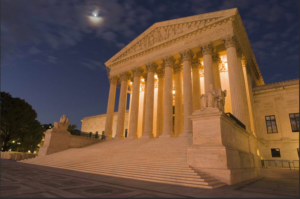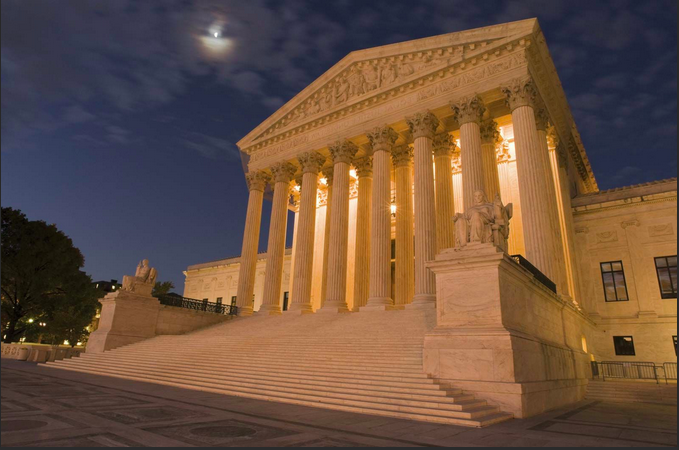
The Donald Trump-appointee led Supreme Court is starting to do some very good things for our nation.
SCOTUS Declares Our Independence from DC’s Great Bureaucracy:
“‘Supreme Court Rules Roe v. Wade Unconstitutional:
“‘The Supreme Court overturned Roe v. Wade Friday morning, ending the federal right to abortion, and returned the issue to the individual states, where roughly half are expected to limit or ban the procedure altogether.
“‘“We end this opinion where we began. Abortion presents a profound moral question,” wrote Justice Samuel Alito. “The Constitution does not prohibit the citizens of each State from regulating or prohibiting abortion. Roe and Casey arrogated that authority. We now overrule those decisions and return that authority to the people and their elected representatives.”’
“‘Supreme Court Curbs EPA’s Climate Powers:
“‘In a 6-3 decision, the majority ruled that Congress did not authorize the EPA to induce a shift to cleaner energy sources using the approach that an Obama-era regulation sought to.
“‘“Congress did not grant EPA…the authority to devise emissions caps based on the generation shifting approach the Agency took in the Clean Power Plan,” the majority wrote, referring to an Obama-era power plant regulation.’…
“‘The case before the Supreme Court dealt with the environment, but the outcome has muddied the potential reach of all government agencies’….
“‘Chief Justice John Roberts focused the majority opinion on what is known as the “major questions doctrine” which essentially says federal agencies need “clear congressional authorization” when adopting major policy shifts.’
“‘Clear congressional authorization’ means about legislation – what the late Justice Antonin Scalia meant about the Constitution:
“‘The Constitution is not a living organism. It’s a legal document, and it says what it says and doesn’t say what it doesn’t say.’
“If a law doesn’t specifically, expressly say the bureaucracy can do something? Then the bureaucracy can’t do that something.”
These two Supreme Court decisions have at least one thing in common: They are about restoration of the rightful roles of the Constitution’s three branches of government – the Legislative, Executive and Judicial.
The EPA decision addresses the abuses of the Executive – Dobbs the abuses of the Judicial.
Unfortunately, all three of our branches of government have spent the last decade-plus (at least) undermining our patent system. These two Court decisions – should also address a whole lot of this.
Will Dobbs Cure the Plague of Patent Eligibility Nonsense?:
“The only group of people who still might believe that their policy preferences in the patent law take precedent over Constitutional separation of powers is the Supreme Court. However, in light of the majority decision in Dobbs v. Jackson Women’s Health, one wonders whether the Supreme Court will finally admit to this lack of authority….
“The Dobbs decision demonstrates that, in the absence of any language in the Constitution, the courts have no authority to rewrite statutory language except under extraordinary circumstances.”
In the context of patents, the Dobbs decision must be considered in context with the Court’s also-very-good “American Axle v. Neapco Holdings, Inc” decision:
“For anyone surprised about the Supreme Court refusing certiorari in the America Axle v. Neapco case after the Department of Justice (DOJ) (aided by the Solicitor’s Office of the U.S. Patent and Trademark Office [USPTO]) submitted its brief for the Supreme Court’s review, the question arises: why would anyone be surprised? The brief at issue is garbage, and one wonders what exactly its purpose was.
“To save time for concerned readers, the DOJ’s brief may be summarized as follows: (1) a bunch of decisions were made on patent eligibility by the Supreme Court over the last 50 years; (2) the Federal Circuit is divided on the exceptions to patent eligibility; and (3) the Solicitor would like clarification as to what is abstract and what is an inventive concept, but not if it involves evidence.
“That is, the DOJ and PTO now demand more subjective theory on Alice-Mayo while deliberately eschewing any objective basis for the test despite the fact that the claims in Bilski, Alice, and Mayo were considered abstract based on evidence in the record.
“What this self-serving drivel stands for is: ‘we best and brightest GS-15s in the Executive love our government-authorized capricious vetoes over patents, and we want to pretend as if we’re actually concerned about the capricious nature of Alice-Mayo, but don’t speak about evidence because evidence has an objective quality that interferes with our capricious vetoes.’”
(Alice-Mayo? Yet another awful, anti-patent Supreme Court ruling.)
Consulting our Patent-to-English dictionary – the above means:
Federal bureaucrats have been funneling garbage, anti-patent rulings and information to the courts for…ever.
Which has contributed to a LOT of garbage, anti-patent rulings by the courts for…ever.
The daisy-chain counter-effect of these recent decisions being?
Anti-patent unelected bureaucrats are prohibited from issuing anti-patent rules and recommendations totally untethered to any legislation.
And thus too are unelected Justices and judges prohibited from issuing anti-patent rulings totally devoid of any tether to legislation or the Constitution.
Well, they should be.
These two Court decisions are a major restoration of Constitutional principles and governance.
That restoration applies to all three branches of government.
Well, it should.

